
What's Going On is the eleventh studio album by American soul singer Marvin Gaye. It was released on May 21, 1971, by the Motown Records subsidiary label Tamla. Recorded between 1970 and 1971 in sessions at Hitsville U.S.A., Golden World, United Sound Studios in Detroit, and at The Sound Factory in West Hollywood, California, it was Gaye's first album to credit him as producer and to credit Motown's in-house session musicians, known as the Funk Brothers.

"I Heard It Through the Grapevine" is a song written by Norman Whitfield and Barrett Strong for Motown Records in 1966. The first recording of the song to be released was produced by Whitfield for Gladys Knight & the Pips and released as a single in September 1967. It went to number one on the Billboard R&B Singles chart and number two on the Billboard Pop Singles chart and shortly became the biggest selling Motown single up to that time.

Let's Get It On is the thirteenth studio album by the American soul singer, songwriter, and producer Marvin Gaye. It was released on August 28, 1973, by the Motown subsidiary label Tamla Records on LP.

"What's Going On" is a song by American singer-songwriter Marvin Gaye, released in 1971 on the Motown subsidiary Tamla. It is the opening track of Gaye's studio album of the same name. Originally inspired by a police brutality incident witnessed by Renaldo "Obie" Benson, the song was composed by Benson, Al Cleveland, and Gaye and produced by Gaye himself. The song marked Gaye's departure from the Motown Sound towards more personal material. Later topping the Hot Soul Singles chart for five weeks and crossing over to number two on the Billboard Hot 100, it would sell over two million copies, becoming Gaye's second-most successful Motown song to date. It was ranked at number 4 in Rolling Stone's 500 Greatest Songs of all Time in 2004 and 2010.
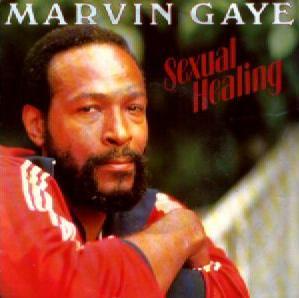
"Sexual Healing" is a song recorded by American singer Marvin Gaye from his seventeenth and final studio album, Midnight Love (1982). It was his first single since his exit from his long-term record label Motown earlier in the year, following the release of the In Our Lifetime (1981) album the previous year. It peaked at No. 3 on the Billboard Hot 100 and is listed at number 198 on Rolling Stone's list of 500 Greatest Songs of All Time. "Sexual Healing" is written and composed in the key of E-flat major and is set in time signature of 4/4 with a tempo of 94 beats per minute.

"Got to Give It Up" is a song by American music artist Marvin Gaye. Written by the singer and produced by Art Stewart as a response to a request from Gaye's record label that he perform disco music, it was released in March 1977.
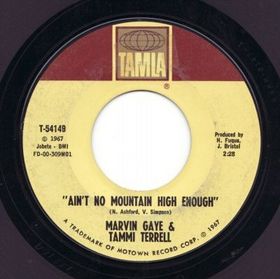
"Ain't No Mountain High Enough" is a song written by Nickolas Ashford & Valerie Simpson in 1966 for the Tamla label, a division of Motown. The composition was first successful as a 1967 hit single recorded by Marvin Gaye and Tammi Terrell, and became a hit again in 1970 when recorded by former Supremes frontwoman Diana Ross. The song became Ross's first solo number-one hit on the Billboard Hot 100 chart and was nominated for the Grammy Award for Best Female Pop Vocal Performance.

I Want You is the fourteenth studio album by American soul singer and songwriter Marvin Gaye. It was released on March 16, 1976, by the Motown Records-subsidiary label Tamla.
"Stubborn Kind of Fellow" is a 1962 song recorded by Marvin Gaye for the Tamla label. Co-written by Gaye and produced by William "Mickey" Stevenson, "Stubborn Kind of Fellow" became Gaye's first hit single, reaching the top 10 of the R&B chart and the top 50 of the Billboard Hot 100 in late 1962.

Something to Remember is a compilation album by American singer Madonna, released by Maverick Records on November 3, 1995. The album was conceived after a highly controversial period in Madonna's career, during which many critics speculated that her career was in decline. The compilation of ballads presented a softer image for the singer and span over a decade, including a reworked version of "Love Don't Live Here Anymore" as well as three new songs: "You'll See", "One More Chance" and a cover of Marvin Gaye's "I Want You". The singles "I'll Remember" and "This Used to Be My Playground", were also included, marking the first time these songs were featured on a Madonna album.

In the Groove is the eighth studio album by soul musician Marvin Gaye, released on August 26, 1968 on the Motown-subsidiary label Tamla Records. It was the first solo studio album Gaye released in two years, in which during that interim, the singer had emerged as a successful duet partner with female R&B singers such as Kim Weston and Tammi Terrell. In the Groove was reissued and retitled as I Heard It Through the Grapevine after the unexpected success of Gaye's recording of the same name, which had been released as a single from the original album.

Inner City Blues: the Music of Marvin Gaye is a tribute album to soul singer Marvin Gaye who died in 1984. It was released in 1995 on the Motown Records label. The album was not a success on the music charts and sales were low. Many critics panned the album, although, Allmusic stated "I Want You" was the album's standout tracks, and WBLS DJ Félix Hernández selected "Stubborn Kind of Fellow" as his choice in his yearly tribute to Marvin Gaye on his "Rhythm Revue" program.
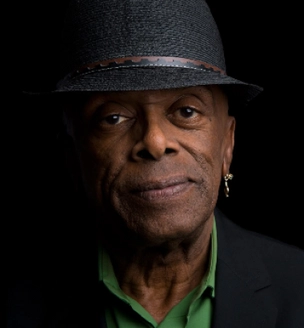
Leon Ware was an American songwriter, producer, composer, and singer. Besides a solo career as a performer, Ware was best known for producing hits for other artists including Michael Jackson, Quincy Jones, Maxwell, Minnie Riperton and Marvin Gaye, co-producing the latter's album, I Want You.

"After the Dance" is a slow jam recorded by singer Marvin Gaye and released as the second single off Gaye's 1976 hit album I Want You. Though it received modest success, the song was widely considered to be one of Gaye's best ballads and served as part of the template for quiet storm and urban contemporary ballads that came afterwards.

Live at the London Palladium is a live double album by soul musician Marvin Gaye, released March 15, 1977, on Tamla Records. Recording sessions took place live at several concerts at the London Palladium in London, England, in October 1976, with the exception of the hit single "Got to Give It Up", which was recorded at Gaye's Los Angeles studio Marvin's Room on January 31, 1977. Live at the London Palladium features intimate performances by Gaye of many of his career highlights, including early hits for Motown and recent material from his previous three studio albums. As with his previous live album, Marvin Gaye Live!, production of the record was handled entirely by Gaye, except for the studio portion, "Got to Give It Up", which was managed by Art Stewart.

"I Wanna Be Where You Are" is a song written by Arthur "T-Boy" Ross and Leon Ware for Michael Jackson, who took the song to number 7 in Cash Box and number 16 on the Billboard Hot 100 pop chart. It also reached number 2 on the Billboard R&B singles chart in 1972.

"All This Love" is a single by DeBarge, released on October 17, 1982. The song was released as the third and final single from their second studio album of the same title on the Gordy label. The single would help DeBarge rise to R&B stardom. A cover version of the song was recorded by Patti LaBelle on her 1994 gold album Gems. A video for her version was also filmed.

Harvey Fuqua was an American R&B singer, songwriter, record producer, and record label executive.
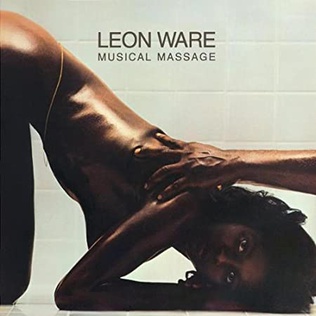
Musical Massage is an album by Leon Ware released in 1976. This was his second solo album and his only release for Motown's Gordy Records subsidy.
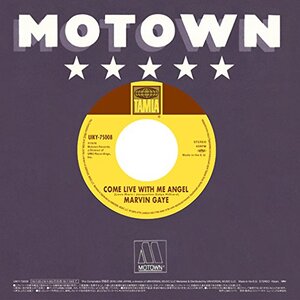
"Come Live with Me Angel" is a smooth soul song by soul singer Marvin Gaye. The song was co-written by singer-songwriter Leon Ware and lyricist Jacqueline Dalya-Hilliard for the former's album Musical Massage. However, Ware gave it to Gaye as he showed interest in it, as well as the other songs Ware had written with Arthur Ross. The song first appeared on Gaye's album I Want You as the second track.


















